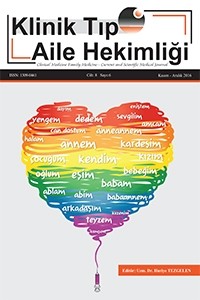İntramusküler Enjeksiyon Sonrası Gelişen Rabdomiyolize Bağlı Akut Böbrek Yetmezliği: Olgu Sunumu
ÖzRabdomiyoliz, etiyolojisinde birçok neden olabilen ve tedavi edilmesi gereken önemli bir durumdur. Özellikle majör travmalar sonrası gelişebileceği gibi, ufak bir intramuküler enjection sonrasında da rabdomiyoliz gelişebilmektedir. Bu hastaların takip ve tedavileri sırasında veya hastaneye başvuru anında akut böbrek yetmezliğide görülebilmektedir. Bu olguda acil servisde yan ağrıları nedeni ile renal kolik düşünülüp, intramusküler (im) analjezik yapılan hastada 24 saat sonra gelişen rabdomiyolize bağlı akut böbrek yetmezliği vakası sunulmuştur.
Anahtar Kelimeler:
Rabdomiyoliz, Akut BöbrekYetmezliği, IntramuskülerEnjeksiyon
Acute Renal Failure Due to Rhabdomyolysis Developing After Intramuscular Injection: Case Report
AbstractRhabdomyolysis is an important condition that can cause a lot of etiology and should be treated. It can develop especially after major traumas, and rhabdomyolysis candevelop after a small intramuscular injection. These can be seen during follow-up andtreatment of patients or at the time of admission to the hospital in acute renal failure. Inthis case, renal colic is considered to be the cause of side pain in the emergency department, and intramuscular (im) analgesic is given to the case of acute renal failure due torhabdomyolysis which develops after 24 hours in the patient.
Keywords:
Rhabdomyolysis, Acute Renal Failure, Intramuscular Injection,
___
- Kaynaklar 1. Melli G, Chaundry V, Cornblath DR. Rhabdomyolysis; an eva-luation of 475 hospitalized patients. Medicine 2005; 84: 377-385. 2. Counselman FL, Lo BM, Tintinalli JE, Stapczynski JS, Ma OJ,Cline DM, et al. Tintinalli’s Emergency Medicine: A Compre-hensive Study Guide, Seventh Edition. Nobel Tıp Kitabevle-ri: McGraw-Hill; 2013; 622-624. 3. Khan FY. Rhabdomyolysis: a review of the literatüre. Neth JMed 2009; 67: 272-283. 4. Shapiro ML, Baldea A, Luchette FA. Rhabdomyolysis in the in-tensive care unit. J Intensive Care Med 2012; 27: 335-342. 5. Bagley WH, Yang H, Shah KH. Rhabdomyolysis. Intern EmergMed 2007; 2: 210-218. 6. Bywaters EGL, Beall D. Crush injuries with impairment of re-nal function. J Am Soc Nephrol 1998; 9: 322-332. 7.Counselman FL. Rhabdomyolisis. In: Tintinalli JE ed. EmergencyMedicine a Comprehensive Study Guide 5th Ed. North Caro-lina: McGraw-Hill; 2000; 1841-1845. 8. Chatzizisis YS, Misirli G, Hatzitolios AI, Giannoglou GD. Thesyndrome of rhabdomyolysis: complications and treatment. EurJ Intern Med 2008; 19: 568-574. 9. Rosa NG, Silva G, Teixeria A, Rodrigues F, Araujo JA. Rhab-domyolysis. Acta Med Port 2005; 18: 271-281. 10. Watnick S, Morrison G. In: Tierney M, ed. Current MedicalDiagnosis and Treatment.39th Ed. San Francisco: McGraw-Hill; 2000; 22: 886-917. 11. Fernandez WG, Hung O, Bruno R. Factors predictive of acu-te renal failure and need for hemodialysis among ED patientswith rhabdomyolysis. Am J Emerg Med 2005; 23:1-7. 12. Gabow PA, Haehny WD, Kelekler SP. The spectrum of rhab-domyolysis. Medicine (Baltimore). 1982; 61:141-152. 13. Dönmez O, Meral A, Yavuz M, Durmaz O. Crush Syndromeof children in the Marmara earthquake, Turkey. Pediatr Int.2001; 43: 678-682. 14. Ron D, Taitelman U, Michaelson M. Prevention of acute re-nal failure in traumatic rhabdomyolisis. Arch Intern Med 1984;144: 277-280.
- ISSN: 1309-0461
- Başlangıç: 2009
- Yayıncı: Selen Medya Yayıncılık Tanıtım ve Organizasyon Hizmetleri
Sayıdaki Diğer Makaleler
Palyatif Bakım Servisinde Multiple Myeloma Tanısı Almış ve Pankreatit Gelişmiş Bir Olgu
Doğum Sonrası Hastanede Kaldıkları İlk Günlerde Sağlıklı Yenidoğanların Özellikleri
Avcılık Kazalarına Bağlı Meydana Gelen Ateşli Silah Ölümleri
“2 Yıldır Ayaklarda Yanma Var ve Alt Ekstremite Vibrasyon Hissi Azalmış”
İntramusküler Enjeksiyon Sonrası Gelişen Rabdomiyolize Bağlı Akut Böbrek Yetmezliği: Olgu Sunumu
Tiroid Bozuklukları İle İnsülin Direnci Arasındaki İlişki
Vitamin B12 Eksikliği ve Tedavisi
Metabolik Sendrom Yönetimi: Bir Olgu Sunumu
Diyabetik Makular Ödemde İntravitreal Triamsinolon Enjeksiyonunun Klinik Sonuçları
